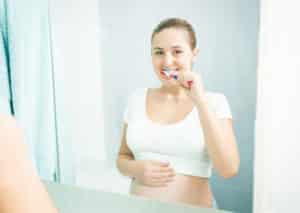How Pregnancy Affects Your Teeth and Gums
How Pregnancy Affects Your Teeth and Gums
You just found out you’re Pregnant. Congratulations!
It’s likely the first things you thought of are the beautiful bassinet you want, the adorable little clothes he or she will wear and those tiny little feet!
You might also be glowing, with that well-known ‘pregnancy glow’. The thought of back pain, stretch marks, and spider veins might be expected. But tooth decay and gum disease?

You should speak with your doctor AND your dentist as soon as your pregnancy is confirmed.
Pregnancy can increase your risk of some oral health problems, and if you have existing issues it’s almost sure to make those worse. Here are a few things you should know:
- Those wonderful hormones that also give you the healthy-looking glow can wreak havoc on your gums. ‘Pregnancy Gingivitis’ is an inflammation of your gums that can cause pain and put your teeth at risk. You may notice that your gums bleed a bit more easily when you floss or you have some gum sensitivity, but there may be no symptoms.
- When pregnant, your risk of tooth decay increases. There can be a few explanations for this:
- Morning sickness can increase the acid exposure to your teeth, which may damage your enamel, making you more susceptible to dental caries. If you suffer from frequent vomiting, you should rinse with a cup of water containing a teaspoon of baking soda and wait an hour before brushing
- You might crave sweets, especially during the first trimester – and this change in your usual diet will affect your teeth. Your OB-Gyn will talk with you about your diet and any supplements you should be taking. Many doctors recommend additional calcium and vitamin D
- Some women are understandably exhausted, and may not keep up with brushing and flossing like they did before they became pregnant.
- During the second trimester, some women experience an overgrowth of tissue on the gums called ‘pregnancy tumors’. These can be caused by excess plaque, and usually appear red and inflamed. Typically, they disappear on their own after your baby is born.
These changes in your body and your routine put you at risk for gestational diabetes, slower intrauterine growth, preeclampsia and even premature delivery.
- You should be aware that bacteria from active decay in your mouth can be transmitted to your newborn – greatly increasing his or her chances for tooth decay before age three. (For more information about the ways in which bacteria can be transmitted to babies, read here: https://www.caringtreechildrensdentistry.com/spit-out-that-pacifier/)
What you may want to discuss with your Dentist
Together, you and your dentist can come up with a plan to ensure your oral health doesn’t suffer during this wonderful and exciting time – often, more frequent exams and cleanings may be all it takes.

- If you plan to become pregnant, it’s the perfect time for you to visit your Dentist and address any oral health issues you may have
- Visiting your Dentist before you become pregnant greatly reduces your risk of having a dental emergency during your pregnancy
- Consider using Xylitol-sweetened gum and toothpaste to avoid sugars
- The American Academy of Pediatric Dentistry recommends you use a fluoridated toothpaste during pregnancy and that you rinse with an alcohol-free .05% sodium fluoride rinse once a day
- Occasionally, periodontal treatment may become necessary during your pregnancy, such as scaling. The American Academy of Periodontology’s current recommendation is that these be done only if necessary and then early in the second trimester
- Dentist’s recommend you receive non-urgent care during the second trimester if possible
- Obviously, if you have a dental emergency, see your Dentist right away – possible infections can be life-threatening
- Your Dentist should ensure you are as comfortable as possible during any dental procedure, and may wish to limit the time you are in the dental chair
- In general, X-rays should be avoided while you are pregnant. If X-rays are necessary due to a dental emergency, your Dentist will limit the number of X-rays to only those which are needed to clearly diagnose your condition
- If local anesthetics are required during pregnancy, be sure to discuss the potential risks with your Dentist. These are generally quite safe, although every woman’s situation is unique
Knowing how pregnancy affects your teeth and gums will help you avoid problems. With proper oral health care, and collaborating with your OB-Gyn and Dentist, you will have the greatest success in keeping your beautiful smile and ensuring your baby’s health. As always, you should feel comfortable asking your Dentist about the latest recommendations by the American Academy of Pediatric Dentists and the American Dental Association.













